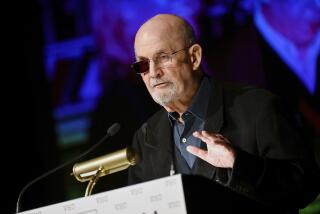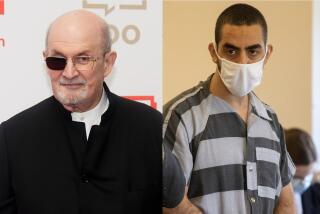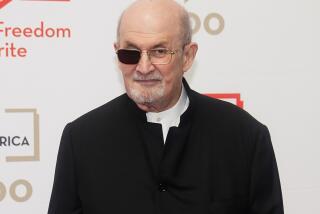Salman Rushdie Controversy
John P. Crossley Jr. made one valid point towards the end of his column âRushdie Is Only an Early Voice in Islamâs Evolutionary Rediscovery of Its Originâ (Op-Ed Page, March 7). He said, âThose who know Mohammed and the Koran best are and will be Muslims.â However, Crossleyâs general treatment of the subject matter suggests that he has yet to accept Muslim scholarship and writings.
Crossley contradicted himself when he supported the following points: âIslam has not had its 19th Century (science of religion) . . . scientific revolution can restore the texts to their original status as the inspired writing of inspired human beings . . . Every Islamic scholar knows that Mohammed incorporated in early version of the Koran a few verses . . . One of the crucial battles taking place in Islam today is over the authorship of the Koran.â Apparently, Crossley exposed his own weaknesses to comprehend Islamic history, for all of these claims have been rejected by Muslim scholars with unanimity on the basis of facts and scientific scrutiny.
To set the record straight, Islamâs â19 Centuryâ began during the first years of the revelation of the Koran (7th Century), remained throughout Islamic history, and continues to develop today. Throughout the history of Islam, scholars vigorously applied the scientific and rational tools to study the two sources of Islam, the Koran and the traditions of the Prophet (Sunna). Many Muslims interpreted revelation differently from mainstream thought, and they were never deprived of the right to pursue their studies according to their own intellectual depth.
Crossleyâs reference of âan early version of the Koranâ is nothing more than a fallacy. The Koran has only one version today which is identical to the version which was revealed to Prophet Mohammed 14 centuries ago--no other religious document has met such supreme standards in authenticity.
Crossleyâs perspective on the scientific survey of al Tabari also proves the shallowness of the professorâs ideas and access to historical facts. No reference to the incident of âsatanic forgeryâ had ever occurred in the Koran nor was it mentioned by the high authorities of Islam: al-Bukhari, Ibn Ishaq, Bayhaqi, Abu Hayyan, Ibn Kathir, Al-Fakhr, Al-Razi, Ibn al-Arabi, Iyad Al-Shakawni, Abusi, and so on.
Additionally, from a linguistic standpoint, an insertion of the so-called âsatanic versesâ would have disturbed the contextual flow of the Koran. The 53 sura (chapter), âThe Star,â which had allegedly contained the forged verses, had been revealed with all of its verses simultaneously as a whole.
Finally, the professor misconstrued the debate between those who believe in either the âcreatedâ or âuncreatedâ Koran. Both sides agree that the Koran was not written by Mohammed. Crossley, however, conveniently overlooked the fact that the argument about the âcreationâ was aimed to emphasize the Koranâs âcreationâ by God and to negate any âeternityâ should be exclusive for God himself and not attributed to revelation.
The authorship of the Koran is an issue among those of other philosophies who found the rise of Islam a challenge to their dogmas and doctrines. The Koran contains several verses which authentically describe its origin as from God who would ultimately preserve his message. Crossleyâs article, nonetheless, raises fundamental questions on the nature of Orientalistsâ scholarship and academic depth in religion. In general, they have denied sources that challenge the stereotyped images about Islam and Muslims made popular during the Crusades and other tense moments in the history of relationships among religions.
FATHI OSMAN
General Counselor
Islamic Center of S.C.






